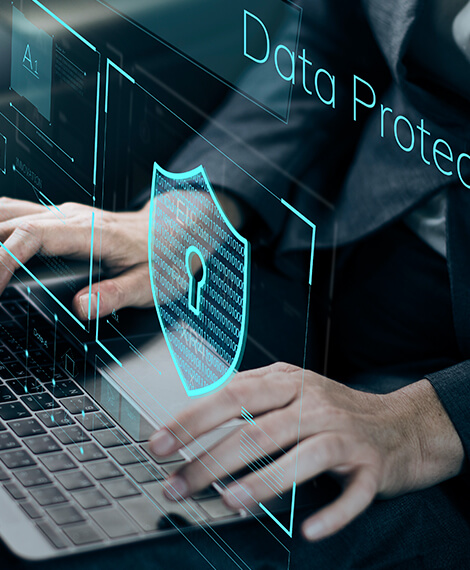Our Services

Struggling to find the right cybersecurity professionals to fortify your organization’s defenses?
Rest assured, you’re not alone. We understand the pressing need to not only recruit top-tier talent but also address the shortage of skills in the cybersecurity industry. It’s imperative to have skilled cyber defenders who can effectively combat the myriad of threats organizations encounter daily.
At Vigilant Globe, we specialize in connecting organizations with top-tier cybersecurity analysts. Whether you’re seeking seasoned Security Operation Center (SOC) Analysts, skilled Incident Responders, Malware Analysts, Threat Hunters, Detection Engineers, or Digital Forensic Analysts, we have the expertise to find the perfect fit for your team.
Our senior cybersecurity analysts seamlessly integrate into your team, providing invaluable mentorship to both your existing in-house cybersecurity team and future hires. With years of industry experience, our senior analysts offer the support and mentorship your team needs to excel.
Understanding that every organization’s cybersecurity needs are unique, we tailor our training to produce professionals perfectly suited to your requirements and ready to adapt to your environment and start delivering high quality services to your clients. Whether you require a SOC analyst, incident responder, malware investigator, or threat hunter, we have the talent to meet your needs.
With our pool of industry experts, you can enhance your security posture and protect your organization from cyber threats effectively. Our analysts possess real-world skills gained through solid experience, ready to help your organization stay safe and focused on serving your clients.
Our analysts understand the unique challenges organizations face and are prepared to provide innovative solutions to enhance your cybersecurity posture.
While traditional programs provide a general overview of cybersecurity concepts, our specialized training goes above and beyond. Our analysts receive targeted instruction in SOC analysis, incident response, malware analysis, threat hunting, and detection engineering, giving them a competitive edge in today’s cybersecurity landscape.
From monitoring and analyzing security events to investigating and responding to cybersecurity incidents, our analysts play a crucial role in protecting your organization’s digital assets. With their expertise in identifying and mitigating cyber threats, our industry experts can help you stay ahead of potential security risks and ensure the integrity of your IT infrastructure.
Don’t miss out on the opportunity to bolster your organization’s cybersecurity defenses. Explore our pool of elite cybersecurity talent and discover how we can help you achieve your security goals.
Schedule a consultation with us today to learn more about our tailored solutions and how we can support your cybersecurity initiatives.
Interested in delving deeper into these roles?
While the descriptions provided offer a glimpse into their responsibilities, it’s important to note that these roles encompass a wide range of duties tailored to each organization’s specific needs and what your organization is currently looking for.
SOC Analyst
A Security Operations Center (SOC) Analyst is a cybersecurity professional who works within a Security Operations Center, the centralized unit that deals with security issues on an organizational and technical level. Their primary responsibilities include but not limited to:
Monitoring and Analysis
Incident Response
Threat Investigation
Staying Updated with Trends
Reporting and Communication
Collaboration and Coordination
Compliance and Policy Enforcement


Incident Responder
An Incident Responder, in the field of cybersecurity, is a specialized professional responsible for addressing and managing the aftermath of a security breach or cyberattack. Their key roles and responsibilities include but not limited to:
- Identification and Analysis: Incident Responders quickly identify and analyze the nature and extent of the security incident, determining the scope of the breach and the systems or data affected.
- Containment Efforts: They work to contain the threat to prevent further damage. This involves isolating affected systems, closing off network access, or taking compromised elements offline.
- Eradication and Recovery: Once the threat is contained, they focus on eradicating the root cause, such as removing malware or closing security loopholes, and then guide the process of safely restoring systems and data to normal operation.
- Investigation: They conduct a thorough investigation to understand how the breach occurred, the vulnerabilities exploited, and the data or systems impacted.
- Communication and Coordination: Effective communication is crucial. Incident Responders often liaise with various departments, management, legal teams, and sometimes law enforcement, ensuring everyone is informed about the incident’s status and impact.
- Documentation and Reporting: They document the incident’s details, actions taken, and lessons learned. This documentation is essential for legal compliance, future security planning, and potentially as evidence in legal actions.
- Preventive Measures: Post-incident, they may suggest or implement additional security measures to prevent similar incidents in the future.
Incident Responders play a critical role in minimizing the impact of cyberattacks and ensuring swift recovery, making them a vital part of any organization’s cybersecurity team.
Threat Hunting
A Threat Hunter is a cybersecurity professional who proactively searches for and identifies threats that evade existing security solutions. Unlike automated security systems that react to known threats, Threat Hunters delve deeper into the network to find malicious activities that might otherwise go unnoticed. Their key roles and responsibilities include but not limited to:
- Proactive Search: They proactively scan and analyze networks, systems, and databases for signs of malicious activities or potential vulnerabilities that could be exploited by attackers.
- Hypothesis Creation: Threat Hunters often develop hypotheses based on their understanding of current threat landscapes, recent security incidents, and emerging trends. These hypotheses guide their search for potential threats.
- Data Analysis: They use various tools and techniques to analyze large volumes of data, looking for patterns or anomalies that indicate a security threat.
- Investigation: When potential threats are identified, Threat Hunters investigate to understand the nature of the threat, its potential impact, and how it managed to bypass existing security measures.
- Collaboration with Security Teams: They work closely with other security team members, like SOC analysts and Incident Responders, to share their findings and collaborate on enhancing security measures.

- Threat Intelligence: Threat Hunters also use and contribute to threat intelligence by keeping up-to-date with the latest security trends and informing the organization about potential future threats.
- Developing Strategies: They help in developing new strategies and tools to strengthen the organization’s defense against cyber attacks.
- Training and Knowledge Sharing: They often share their knowledge and insights with other team members, helping to improve overall team skills and awareness.
Threat Hunters play a critical role in cybersecurity by taking a proactive approach to security, which is crucial for detecting advanced persistent threats and sophisticated cyber attacks. Their expertise and proactive strategies are vital for organizations looking to stay ahead of potential security threats.

Malware Investigator
A Malware Investigator, also known as a Malware Analyst is a cybersecurity professional who specializes in analyzing and understanding malware, which includes viruses, worms, trojans, ransomware, and other malicious software. Their primary role is to dissect and study malware to understand how it works, how it can cause damage, and how it can be detected and mitigated. Key responsibilities and aspects of their role include but not limited to:
- Malware Analysis: They dissect and reverse-engineer malware to understand its characteristics, behavior, and impact. This involves both static (examining the malware without executing it) and dynamic (analyzing the malware in a controlled environment while it’s running) analysis.
- Identifying Threats: By understanding the nature of the malware, they help in identifying the potential threat it poses to an organization’s IT infrastructure.
- Developing Countermeasures: Based on their analysis, Malware Investigators help in developing strategies, tools, and processes to detect and neutralize malware. This can include creating signatures for antivirus software or developing new security protocols.
- Incident Response Support: They often work closely with Incident Response teams to address active malware threats, providing expert advice on containment, eradication, and recovery processes.
- Research and Development: Malware Investigators keep up-to-date with the latest trends in malware development and cybersecurity threats. They also conduct research to stay ahead of emerging malware techniques and tactics.
- Reporting and Documentation: They produce detailed reports on their findings, which are vital for documenting incidents, improving future responses, and sharing knowledge with the broader cybersecurity community.
- Education and Training: They often contribute to educating other team members and employees about malware threats and best practices for prevention and detection.
- Forensic Analysis: In the case of a security breach or attack, they perform forensic analysis to trace back the source of the malware, understand how it infiltrated the system, and assess the extent of the damage.
A Malware Investigator plays a crucial role in protecting an organization from the ever-evolving threats posed by malicious software. Their expertise is essential for understanding the complexities of malware and for developing effective defense mechanisms against such cyber threats.
Detection Engineering
A Detection Engineer, also known as a Threat Detection Engineer, specializes in creating and refining detection mechanisms to identify and respond to cybersecurity threats effectively. Their primary role revolves around analyzing security events and incidents to develop detection strategies, investigating potential threats, and recommending improvements to enhance detection capabilities. Key responsibilities and aspects of their role include:
- Developing Detection Mechanisms: They focus on building detection rules, queries, and signatures for automated threat detection systems like SIEM platforms.
- Analyzing Security Events: Detection Engineers analyze security events and incidents to understand the nature of potential threats and develop strategies for detecting them.
- Collaborating with Security Teams: They work closely with Incident Response Analysts, Security Operations Center (SOC) teams, and other cybersecurity professionals to ensure timely and effective response to security incidents.

- Enhancing Detection Capabilities: They continuously refine and update detection mechanisms to keep pace with evolving cyber threats and improve overall detection capabilities.
- Incident Response Support: Detection Engineers provide support during security incidents, assisting in the investigation, containment, and remediation of threats.
- Monitoring System Performance: They monitor the performance of detection systems, ensuring that security requirements are met and maintaining strong working relationships with team members.
- Vulnerability Management: They analyze findings from vulnerability reports, assist with risk assessments, and coordinate remediation and patching activities with system owners.
- Communication and Documentation: Detection Engineers communicate effectively with technical and non-technical audiences, documenting their findings and recommendations for future reference. Overall, Detection Engineers play a critical role in safeguarding organizations’ digital assets by proactively detecting and mitigating cybersecurity threats.
Consulting

Enhance Your Team with Elite Cybersecurity Talent
Are you contemplating how to elevate your team’s expertise with seasoned cybersecurity analysts? Look no further. We offer the opportunity to integrate top-tier cybersecurity professionals into your team. They bring a wealth of experience in combating threats, executing thorough investigations, and implementing preventive measures. This collaboration not only strengthens your team’s capabilities but also provides an invaluable learning experience from experts who’ve triumphed in the cybersecurity battlefield.

Mentorship from Seasoned Cybersecurity Professionals
Imagine having direct access to a mentor with battle-tested cybersecurity experience, someone who has navigated the complexities of the field and emerged with insights only experience can offer. We make this possible. Schedule a one-on-one call with our elite cyber professionals, available in various mentorship packages ranging from 1 hour to ongoing support. They will answer your queries, share invaluable tips and advice, and guide you in carving a successful path in cybersecurity, pointing you towards resources that can propel your career forward.

Premier Cybersecurity Training
If it’s top-notch training you seek, our programs are among the industry’s finest. Designed to equip you with the skills and knowledge required to excel in the cybersecurity world, our training ensures you are well-prepared to secure your dream job in this dynamic field. With us, you’re not just learning; you’re preparing to make a significant impact in the world of cybersecurity.
